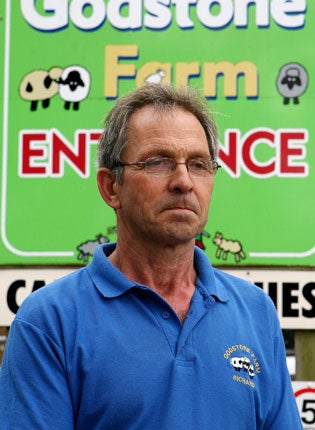E. coli outbreak: thousands of children at risk
Manager of farm where victims contracted disease says he did nothing wrong

Health officials have warned that thousands of young children and families could be at risk of contracting E. coli after visiting a popular children's farm. Twelve children aged between 18 months and 10 years are being treated for the O157 strain of bacteria after visiting Godstone Farm in Surrey. Yesterday, three of the affected children remained "seriously ill" in hospital.
Neil Wilson, an uncle of one of the sick children, spoke of the "nightmare" his family is experiencing. He said: "It's been a living hell. It seems quite surreal going in and each day seeing him getting worse and worse, feeding tubes and blood going in."
The Health Protection Agency said more children could fall ill following the long incubation period and the possibility of person-to-person contact that increased the likelihood of infection among children and families. Thirty-six cases have been reported so far.
There was concern yesterday at the length of time taken to close the farm after the outbreak last month. The Independent was told that the first case of 0157 bacteria was reported on 27 August which resulted in increased signage across the farm urging visitors to wash their hands. But it was not until 5 September that visitor contact with animals was stopped in an attempt to contain the outbreak.
Evelina Niedzwiedzka, 28, from Croydon, south London, who visited the farm recently with her 23-month-old daughter, said: "If the farm did know about it two weeks ago, I'm very surprised there were no warnings, especially as children are so vulnerable."
Dr Angela Iverson, director of Surrey and Sussex Health Protection Agency, said: "We have isolated cases of 0157 reported from time to time and if we shut every petting farm on a single case, we'd be closing down a lot of farms regularly."
The source of the outbreak had not been confirmed last night, but health officials believe it could have come when children petted infected animals, transferring bacteria from faeces to their hands and then on to their mouths.
Yesterday, Richard Oatway, manager of Godstone Farm, said the farm had "done enough" to encourage children to wash their hands after touching the animals. "All the staff at the farm are very upset about the outbreak and we hope that all the children make a full and speedy recovery. We have taken the decision to close the farm until the authorities have finished their investigations. These have been very thorough and are still ongoing."
Health authorities are advising anyone who has become ill after visiting the farm since 8 August, or members of their household, to seek medical advice immediately. Echerichia coli, or E. coli, is a common bacterium that lives in the intestines of most warm-blooded animals, including humans. Most strains are harmless and can even be beneficial to their hosts. But the 0157 strain is an exception and its symptoms range from mild diarrhoea to abdominal cramps and kidney failure.
Join our commenting forum
Join thought-provoking conversations, follow other Independent readers and see their replies
Comments
Bookmark popover
Removed from bookmarks